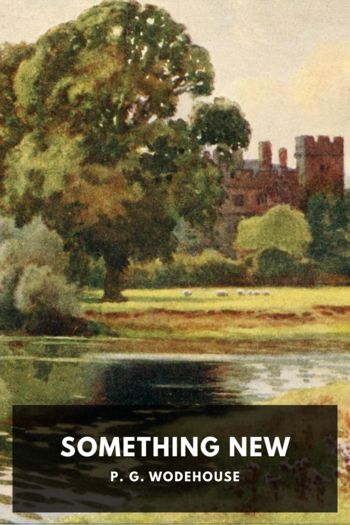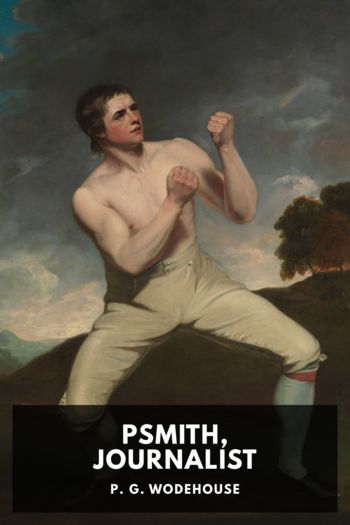Leave It to Psmith by P. G. Wodehouse (best ereader for academics TXT) 📕

- Author: P. G. Wodehouse
Book online «Leave It to Psmith by P. G. Wodehouse (best ereader for academics TXT) 📕». Author P. G. Wodehouse
“No?” said Miss Clarkson.
“No. Last night I was obliged to inform him that the fish business was all right, but it wouldn’t do, and that I proposed to sever my connection with the firm for ever. I may say at once that there ensued something in the nature of a family earthquake. Hard words,” sighed Psmith. “Black looks. Unseemly wrangle. And the upshot of it all was that my uncle washed his hands of me and drove me forth into the great world. Hence my anxiety to find employment. My uncle has definitely withdrawn his countenance from me, Miss Clarkson.”
“Dear, dear!” murmured the proprietress sympathetically.
“Yes. He is a hard man, and he judges his fellows solely by their devotion to fish. I never in my life met a man so wrapped up in a subject. For years he has been practically a monomaniac on the subject of fish. So much so that he actually looks like one. It is as if he had taken one of those autosuggestion courses and had kept saying to himself, ‘Every day, in every way, I grow more and more like a fish.’ His closest friends can hardly tell now whether he more nearly resembles a halibut or a cod. … But I am boring you again with this family gossip?”
He eyed Miss Clarkson with such a sudden and penetrating glance that she started nervously.
“No, no,” she exclaimed.
“You relieve my apprehensions. I am only too well aware that, when fairly launched on the topic of fish, I am more than apt to weary my audience. I cannot understand this enthusiasm for fish. My uncle used to talk about an unusually large catch of pilchards in Cornwall in much the same awed way as a right-minded curate would talk about the spiritual excellence of his bishop. To me, Miss Clarkson, from the very start, the fish business was what I can only describe as a washout. It nauseated my finer feelings. It got right in amongst my fibres. I had to rise and partake of a simple breakfast at about four in the morning, after which I would make my way to Billingsgate Market and stand for some hours knee-deep in dead fish of every description. A jolly life for a cat, no doubt, but a bit too thick for a Shropshire Psmith. Mine, Miss Clarkson, is a refined and poetic nature. I like to be surrounded by joy and life, and I know nothing more joyless and deader than a dead fish. Multiply that dead fish by a million, and you have an environment which only a Dante could contemplate with equanimity. My uncle used to tell me that the way to ascertain whether a fish was fresh was to peer into its eyes. Could I spend the springtime of life staring into the eyes of dead fish? No!” He rose. “Well, I will not detain you any longer. Thank you for the unfailing courtesy and attention with which you have listened to me. You can understand now why my talents are on the market and why I am compelled to state specifically that no employment can be considered which has anything to do with fish. I am convinced that you will shortly have something particularly good to offer me.”
“I don’t know that I can say that, Mr. Psmith.”
“The p is silent, as in pshrimp,” he reminded her. “Oh, by the way,” he said, pausing at the door, “there is one other thing before I go. While I was waiting for you to be disengaged, I chanced on an instalment of a serial story in The Girl’s Pet for January, 1919. My search for the remaining issues proved fruitless. The title was ‘Her Honour At Stake,’ by Jane Emmeline Moss. You don’t happen to know how it all came out in the end, do you? Did Lord Eustace ever learn that, when he found Clarice in Sir Jasper’s rooms at midnight, she had only gone there to recover some compromising letters for a girl friend? You don’t know? I feared as much. Well, good morning, Miss Clarkson, good morning. I leave my future in your hands with a light heart.”
“I will do my best for you, of course.”
“And what,” said Psmith cordially, “could be better than Miss Clarkson’s best?”
He closed the door gently behind him, and went out. Struck by a kindly thought, he tapped upon Enquiries’ window, and beamed benevolently as her bobbed head shot into view.
“They tell me,” he said, “that Aspidistra is much fancied for the four o’clock race at Birmingham this afternoon. I give the information without prejudice, for what it is worth. Good day!”
VI Lord Emsworth Meets a Poet IThe rain had stopped when Psmith stepped out into the street, and the sun was shining again in that half blustering, half apologetic manner which it affects on its reappearance after a summer shower. The pavements glistened cheerfully, and the air had a welcome freshness. Pausing at the corner, he pondered for a moment as to the best method of passing the hour and twenty minutes which must elapse before he could reasonably think of lunching. The fact that the offices of the Morning Globe were within easy strolling distance decided him to go thither and see if the first post had brought anything in the shape of answers to his advertisements. And his energy was rewarded a few minutes later when Box 365 on being opened yielded up quite a little budget of literary matter. No fewer than seven letters in all. A nice bag.
What, however, had appeared at first sight evidence of a pleasing ebullition of enterprise on the part of the newspaper-reading public turned out on closer inspection, when he had retired to a corner where he could concentrate in peace, a hollow delusion. Enterprising in a sense though the communications were—and they certainly showed the





Comments (0)